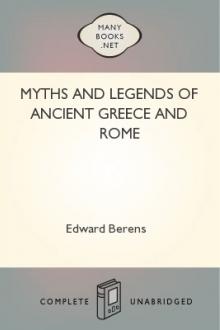Myths and Legends of Ancient Greece and Rome by E. M. Berens (best romantic novels in english txt) 📕

- Author: E. M. Berens
- Performer: -
Book online «Myths and Legends of Ancient Greece and Rome by E. M. Berens (best romantic novels in english txt) 📕». Author E. M. Berens
Many years passed away, during which time the long and wearisome siege of Troy had come to an end, and the brave Agamemnon had returned home to meet death at the hands of his wife and Aegisthus. But his daughter, Iphigenia, was still an exile from her native country, and continued to perform the terrible duties which her office involved. She had long given up all hopes of ever being restored to her friends, when one day two Greek strangers landed on Taurica's inhospitable shores. These were Orestes and Pylades, whose romantic attachment to each other has made their names synonymous for devoted self-sacrificing friendship. Orestes was Iphigenia's brother, and Pylades her cousin, and their object in undertaking an expedition fraught with so much peril, was to obtain the statue of the Taurian Artemis. Orestes, having incurred the anger of the Furies for avenging the murder of his father Agamemnon, was pursued by them wherever he went, until at last he was informed by the oracle of Delphi that, in order to pacify them, he must convey the image of the Taurian Artemis from Tauris to Attica. This he at once resolved to do, and accompanied by his faithful friend Pylades, who insisted on sharing the dangers of the undertaking, he set out for Taurica. But the unfortunate youths had hardly stepped on shore before they were seized by the natives, who, as usual, conveyed them for sacrifice to the temple of Artemis. Iphigenia, discovering that they were Greeks, though unaware of their near relationship to herself, thought the opportunity a favourable one for sending tidings of her existence to her native country, and, accordingly, requested one of the strangers to be the bearer of a letter from her to her family. A magnanimous dispute now arose between the friends, and each besought the other to accept the precious privilege of life and freedom. Pylades, at length overcome by the urgent entreaties of Orestes, agreed to be the bearer of the missive, but on looking more closely at the superscription, he observed, to his intense surprise, that it was addressed to Orestes. Hereupon an explanation followed; the brother and sister recognized each other, amid joyful tears and loving embraces, and assisted by her friends and kinsmen, Iphigenia escaped with them from a country where she had spent so many unhappy days, and witnessed so many scenes of horror and anguish.
The fugitives, having contrived to obtain the image of the Taurian Artemis, carried it with them to Brauron in Attica. This divinity was henceforth known as the Brauronian Artemis, and the rites which had rendered her worship so infamous in Taurica were now introduced into Greece, and human victims bled freely under the sacrificial knife, both in Athens and Sparta. The revolting practice of offering human sacrifices to her, was continued until the time of Lycurgus, the great Spartan lawgiver, who put an end to it by substituting in its place one, which was hardly less barbarous, namely, the scourging of youths, who were whipped on the altars of the Brauronian Artemis in the most cruel manner; sometimes indeed they expired under the lash, in which case their mothers, far from lamenting their fate, are said to have rejoiced, considering this an honourable death for their sons.
SELENE-ARTEMIS.
Hitherto we have seen Artemis only in the various phases of her terrestrial character; but just as her brother Apollo drew into himself by degrees the attributes of that more ancient divinity Helios, the sun-god, so, in like manner, she came to be identified in later times with Selene, the moon-goddess, in which character she is always represented as wearing on her forehead a glittering crescent, whilst a flowing veil, bespangled with stars, reaches to her feet, and a long robe completely envelops her.
DIANA.
The Diana of the Romans was identified with the Greek Artemis, with whom she shares that peculiar tripartite character, which so strongly marks the individuality of the Greek goddess. In heaven she was Luna (the moon), on earth Diana (the huntress-goddess), and in the lower world Proserpine; but, unlike the Ephesian Artemis, Diana, in her character as Proserpine, carries with her into the lower world no element of love or sympathy; she is, on the contrary, characterized by practices altogether hostile to man, such as the exercise of witchcraft, evil charms, and other antagonistic influences, and is, in fact, the Greek Hecate, in her later development.
The statues of Diana were generally erected at a point where three roads met, for which reason she is called Trivia (from tri, three, and via, way).
A temple was dedicated to her on the Aventine hill by Servius Tullius, who is said to have first introduced the worship of this divinity into Rome.
The Nemoralia, or Grove Festivals, were celebrated in her honour on the 13th of August, on the Lacus Nemorensis, or forest-buried lake, near Aricia. The priest who officiated in her temple on this spot, was always a fugitive slave, who had gained his office by murdering his predecessor, and hence was constantly armed, in order that he might thus be prepared to encounter a new aspirant.
HEPHÆSTUS (Vulcan).Hephæstus, the son of Zeus and Hera, was the god of fire in its beneficial aspect, and the presiding deity over all workmanship accomplished by means of this useful element. He was universally honoured, not only as the god of all mechanical arts, but also as a house and hearth divinity, who exercised a beneficial influence on civilized society in general. Unlike the other Greek divinities, he was ugly and deformed, being awkward in his movements, and limping in his gait. This latter defect originated, as we have already seen, in the wrath of his father Zeus, who hurled him down from heaven[35] in consequence of his taking the part of Hera, in one of the domestic disagreements, which so frequently arose between this royal pair. Hephæstus was a whole day falling from Olympus to the earth, where he at length alighted on the island of Lemnos. The inhabitants of the country, seeing him descending through the air, received him in their arms; but in spite of their care, his leg was broken by the fall, and he remained ever afterwards lame in one foot. Grateful for the kindness of the Lemnians, he henceforth took up his abode in their island, and there built for himself a superb palace, and forges for the pursuit of his avocation. He instructed the people how to work in metals, and also taught them other valuable and useful arts.
It is said that the first work of Hephæstus was a most ingenious throne of gold, with secret springs, which he presented to Hera. It was arranged in such a manner that, once seated, she found herself unable to move, and though all the gods endeavoured to extricate her, their efforts were unavailing. Hephæstus thus revenged himself on his mother for the cruelty she had always displayed towards him, on account of his want of comeliness and grace. Dionysus, the wine god, contrived, however, to intoxicate Hephæstus, and then induced him to return to Olympus, where, after having released the queen of heaven from her very undignified position, he became reconciled to his parents.
He now built for himself a glorious palace on Olympus, of shining gold, and made for the other deities those magnificent edifices which they inhabited. He was assisted in his various and exquisitely skilful works of art, by two female statues of pure gold, formed by his own hand, which possessed the power of motion, and always accompanied him wherever he went. With the assistance of the Cyclops, he forged for Zeus his wonderful thunderbolts, thus investing his mighty father with a new power of terrible import. Zeus testified his appreciation of this precious gift, by bestowing upon Hephæstus the beautiful Aphrodite in marriage,[36] but this was a questionable boon; for the lovely Aphrodite, who was the personification of all grace and beauty, felt no affection for her ungainly and unattractive spouse, and amused herself by ridiculing his awkward movements and unsightly person. On one occasion especially, when Hephæstus good-naturedly took upon himself the office of cup-bearer to the gods, his hobbling gait and extreme awkwardness created the greatest mirth amongst the celestials, in which his disloyal partner was the first to join, with unconcealed merriment.
Aphrodite greatly preferred Ares to her husband, and this preference naturally gave rise to much jealousy on the part of Hephæstus, and caused them great unhappiness.
Hephæstus appears to have been an indispensable member of the Olympic Assembly, where he plays the part of smith, armourer, chariot-builder, &c. As already mentioned, he constructed the palaces where the gods resided, fashioned the golden shoes with which they trod the air or water, built for them their wonderful chariots, and shod with brass the horses of celestial breed, which conveyed these glittering equipages over land and sea. He also made the tripods which moved of themselves in and out of the celestial halls, formed for Zeus the far-famed ægis, and erected the magnificent palace of the sun. He also created the brazen-footed bulls of Aetes, which breathed flames from their nostrils, sent forth clouds of smoke, and filled the air with their roaring.
Among his most renowned works of art for the use of mortals were: the armour of Achilles and Æneas, the beautiful necklace of Harmonia, and the crown of Ariadne; but his masterpiece was Pandora, of whom a detailed account has already been given.
There was a temple on Mount Etna erected in his honour, which none but the pure and virtuous were permitted to enter. The entrance to this temple was guarded by dogs, which possessed the extraordinary faculty of being able to discriminate between the righteous and the unrighteous, fawning upon and caressing the good, whilst they rushed upon all evil-doers and drove them away.
Hephæstus is usually represented as a powerful, brawny, and very muscular man of middle height and mature age; his strong uplifted arm is raised in the act of striking the anvil with a hammer, which he holds in one hand, whilst with the other he is turning a thunderbolt, which an eagle beside him is waiting to carry to Zeus. The principal seat of his worship was the island of Lemnos, where he was regarded with peculiar veneration.
VULCAN.
The Roman Vulcan was merely an importation from Greece, which never at any time took firm root in Rome, nor entered largely into the actual life and sympathies of the nation, his worship being unattended by the devotional feeling and enthusiasm which characterized the religious rites of the other deities. He





Comments (0)